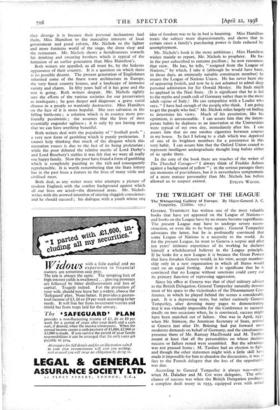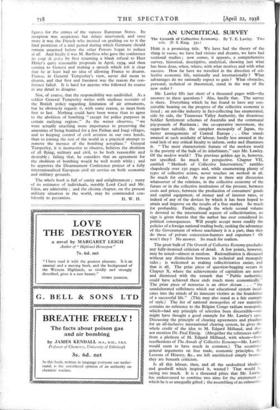THE TWILIGHT OF THE LEAGUE GENERAL TEMPERLEY has written one
of the most valuable books that have yet appeared on the League of Nations—
and books on the League have by no means become superfluous.
The present League may have to undergo severe recon- struction, or even die to be born again ; General Temperley advocates the latter, but he is profoundly convinced that some League of Nations is a necessity to the world. As for the present League, he went to Geneva a sceptic and after _ ten years' intimate experience of its working he declares himself a wholehearted believer in the League principle.
If he looks for a new League it is because the Great Powers that have forsaken Geneva would, in his view, accept member- ship only in a new organisation in which all States would start on an equal footing. And it is significant that he is convinced that no League without sanctions could carry out its primary function of repressing aggression.
Since his office at Geneva was that of chief military adviser to the British Delegation, General Temperley naturally devotes most of his space to the vicissitudes of the Disarmament Con- ference, in which he played behind the scenes a considerabl, part. It is a depressing story, but rather curiously Genera: Temperley, after devoting many pages to demonstrating that it was virtually impossible for the Conference to succeed dwells on two occasions when, he is convinced, success migh' hive been snatched out of failure. One was in April, 1932 when Mr. Stimson, the American Secretary of State, arrived at Geneva just after Dr. Bruning had put forward most moderate demands on behalf of Germany, and the simultaneous presence there of Mr. Ramsay MacDonald and M. Tardieu meant at least that all the personalities on whose decision success or failure rested were assembled. But the advantag was not pressed home ; M. Tardieu had an election to fight, and though the other statesmen might with a little skill have made it impossible for him to abandon the discussions, it was i:, fact to the French delegate that the loss of the opportunit: was due.
According to General Temperley it always was—excel' when M. Daladier and M. Cot were delegates. The other chance of success was when the British Delegation produce.• a complete draft treaty in 1933, equipped even with actual figures for the armies of the various European States. Its reception was auspicious but delays intervened, and once more it was the French who insisted on grafting on to it the fatal provision of a trial period during which Germany should remain unarmed before the other Powers began to reduce at all And finally it was M. Barthou who gave the conference its coup de grdce by first returning a blank refusal to Herr Hitler's quite reasonable proposals in April, 1934, and then coming to Geneva and making a speech which left it clear that he at least had no idea of allowing France to disarm. France, in General Temperley's view, never did mean to disarm, and that first and foremost was the reason the con- ference failed. It is hard for anyone who followed its course in any detail to disagree.
Not, of course, that the responsibility was undivided. As a soldier General Temperley writes with studious restraint of the British policy regarding limitation of air armaments, but he obviously regards it, with some reason, as inept from first to last. Nothing could have been worse than to agree to the abolition of bombing " except for police purposes in certain outlying regions." As the writer observes, " we were actually attaching more importance to preserving the amenities of being bombed for a few Pathan and Iraqi villages, and to keeping control of civil aviation in our own hands, than to joining the rest of the world in a practical attempt to remove the menace of the bombing aeroplane." General Temperley, it is instructive to observe, believes the abolition of all flying, military and civil, to be both reasonable and desirable ; failing that, he considers that an agreement for the abolition of bombing would be well worth while ; and he approves the Disarmament Conference project of a fully internationalised European civil air service on both economic and military grounds.
The whole book is full of sanity and enlightenment ; many of its estimates of individuals, notably Lord Cecil and Mr. Eden, are admirable ; and the closing chapter, on the present military situation in the world, may be commended con-











































 Previous page
Previous page